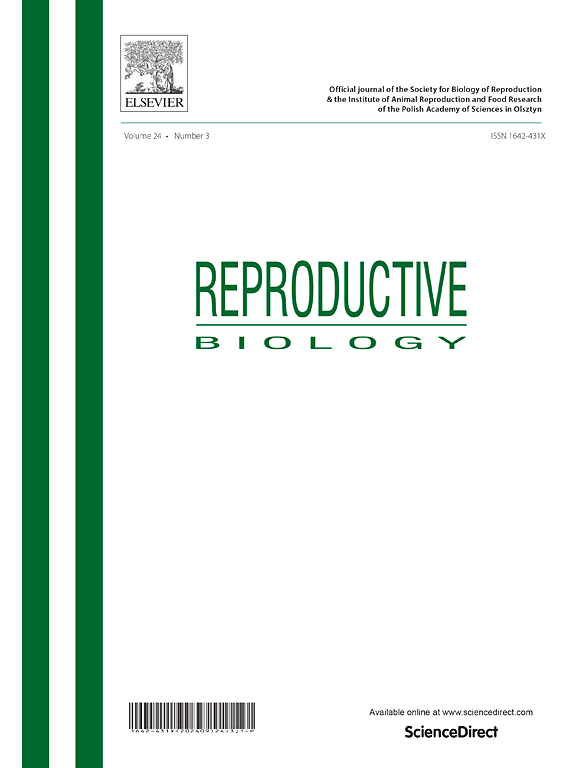分析PET-MPs对男性不育的毒理学影响:来自网络毒理学、孟德尔随机化和转录组学的见解
IF 2.5
3区 生物学
Q3 REPRODUCTIVE BIOLOGY
引用次数: 0
摘要
目前的研究表明,聚对苯二甲酸乙二醇酯微塑料(PET-MPs)可能严重损害男性生殖功能。本研究旨在探讨这种损伤的潜在分子机制。通过SwissTargetPrediction数据库预测PET-MPs的潜在基因靶点。男性不育的GWAS汇总统计数据来自GWAS目录,eQTL数据来自eQTLGen数据库。随后进行SMR分析,以确定与男性不育有显著因果关系的基因。PET-MPs导致男性不育的潜在靶标最终通过交叉两个基因集确定。此外,大量RNA-seq和scRNA-seq分析被用于阐明pet - mps诱导男性不育的潜在分子机制。我们的研究结果表明,CLK4可能是PET-MPs导致男性不育的一个功能靶点,CLK4表达升高是一个重要的危险因素。分子对接和分子动力学模拟表明PET-MPs可以与CLK4蛋白形成稳定的结合构象。我们进一步发现终末分化的CD4+ T细胞是男性不育的重要危险因素,揭示了CLK4表达水平与Th1细胞浸润之间的显著正相关。此外,CLK4在精细胞向精子分化过程中表现出双相表达模式,最初升高,随后下调。这些观察结果表明,PET-MPs可能通过靶向CLK4调节Th1细胞浸润和破坏正常的生精过程参与男性不育的发病机制。总之,我们的研究表明CLK4可能是pet - mp诱导的男性不育的潜在靶点,我们进一步阐明了潜在的分子机制。本文章由计算机程序翻译,如有差异,请以英文原文为准。
Analyzing the toxicological effects of PET-MPs on male infertility: Insights from network toxicology, mendelian randomization, and transcriptomics
Current research indicates that polyethylene terephthalate microplastics (PET-MPs) may significantly impair male reproductive function. This study aimed to investigate the potential molecular mechanisms underlying this impairment. Potential gene targets of PET-MPs were predicted via the SwissTargetPrediction database. GWAS summary statistics for male infertility were obtained from the GWAS Catalog, and eQTL data were acquired from the eQTLGen database. SMR analysis was subsequently performed to identify genes exhibiting significant causal associations with male infertility. The potential targets of PET-MPs contributing to male infertility were ultimately identified by intersecting the two gene sets. Additionally, bulk RNA-seq and scRNA-seq analyses were employed to elucidate the potential molecular mechanisms underlying PET-MPs-induced male infertility. Our findings suggest that CLK4 may serve as a functional target through which PET-MPs contribute to male infertility, with elevated CLK4 expression representing a significant risk factor. Molecular docking and molecular dynamics simulations demonstrated that PET-MPs can form stable binding conformations with the CLK4 protein. We further identified terminally differentiated CD4+ T cells as a prominent risk factor for male infertility, revealing a significant positive correlation between CLK4 expression levels and Th1 cell infiltration. Additionally, CLK4 exhibited a biphasic expression pattern during spermatocyte-to-sperm differentiation, initially increasing before subsequent downregulation. These observations indicate that PET-MPs may participate in the pathogenesis of male infertility by targeting CLK4 to modulate Th1 cell infiltration and disrupt normal spermatogenic processes. In conclusion, our study demonstrates that CLK4 may serve as a potential target for PET-MP-induced male infertility, and we further elucidate the underlying molecular mechanisms.
求助全文
通过发布文献求助,成功后即可免费获取论文全文。
去求助
来源期刊

Reproductive biology
生物-生殖生物学
CiteScore
3.90
自引率
0.00%
发文量
95
审稿时长
29 days
期刊介绍:
An official journal of the Society for Biology of Reproduction and the Institute of Animal Reproduction and Food Research of Polish Academy of Sciences in Olsztyn, Poland.
Reproductive Biology is an international, peer-reviewed journal covering all aspects of reproduction in vertebrates. The journal invites original research papers, short communications, review articles and commentaries dealing with reproductive physiology, endocrinology, immunology, molecular and cellular biology, receptor studies, animal breeding as well as andrology, embryology, infertility, assisted reproduction and contraception. Papers from both basic and clinical research will be considered.
 求助内容:
求助内容: 应助结果提醒方式:
应助结果提醒方式:


